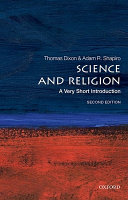

Most ebook files are in PDF format, so you can easily read them using various software such as Foxit Reader or directly on the Google Chrome browser.
Some ebook files are released by publishers in other formats such as .awz, .mobi, .epub, .fb2, etc. You may need to install specific software to read these formats on mobile/PC, such as Calibre.
Please read the tutorial at this link: https://ebookbell.com/faq
We offer FREE conversion to the popular formats you request; however, this may take some time. Therefore, right after payment, please email us, and we will try to provide the service as quickly as possible.
For some exceptional file formats or broken links (if any), please refrain from opening any disputes. Instead, email us first, and we will try to assist within a maximum of 6 hours.
EbookBell Team

4.1
100 reviewsVery Short Introductions: Brilliant, Sharp, Inspiring
Debates about science and religion are rarely out of the news. Whether it concerns what's being taught in schools, clashes between religious values and medical recommendations, or questions about how to address our changing global environment, emotions often run high and answers seem intractable. Yet there is much more to science and religion than the clash of extremes.
As Thomas Dixon and Adam Shapiro show in this balanced and thought-provoking Very Short Introduction, a whole range of views, subtle arguments, and fascinating perspectives can be found on this complex and centuries-old subject. They explore the key philosophical questions that underlie the debate, but also highlight the social, political, and ethical contexts that have made the tensions between science and religion such a fraught and interesting topic in the modern world. In this new edition, Dixon and Shapiro connect historical concepts such as evolution, the heliocentric solar system, and the problem of evil to present-day issues including the politicization of science; debates over mind, body, and identity; and the moral necessity of addressing environmental change. Ranging from medical missionaries to congregations adopting new technologies during a pandemic, from Galileo's astronomy to building the Thirty Meter Telescope, they explore how some of the most complex social issues of our day are rooted in discussions of science and religion.